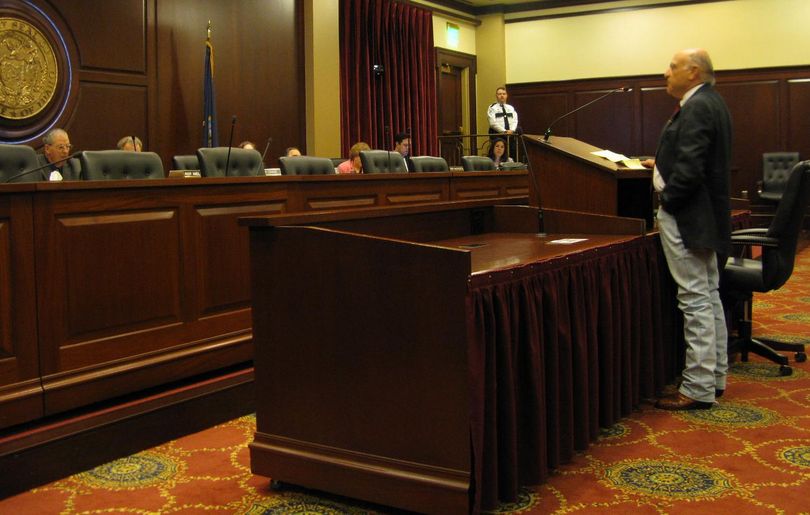Instant racing hearing: ‘Save the horse racing industry,’ ‘Bells and whistles,’ ‘I’m being persecuted’

Testimony is continuing this morning in the Lincoln Auditorium on SB 1011, the bill to repeal instant racing in Idaho. So far, seven people have testified in two hours, seven against and two for. Opponents include John Sheldon, president of Treasure Valley Racing, operator of Les Bois Park, who told the House State Affairs Committee, “These terminals are judged by the functionality, not the esthetics. … They operate completely as a pari-mutuel wager. The results of the race are actually represented by the arrangement of the characters and the objects on the screen.” He said, “Give us the opportunity to continue working to save the horse racing industry in Idaho.”
Duayne Didericksen, former state Racing Commission executive director, former Les Bois Park general manager, and currently with the American Quarter Horse Association, shared some history with the lawmakers, and said Les Bois Park was closed for about five years, on and off, since 2003. “Simulcasting was the tool that saved us all,” he said, allowing revenue to come in even when live horse races weren’t running. But that dropped off, too, with competition from other forms of gambling.
Rep. Gayle Batt, R-Wilder, said that’s the same argument being used for instant racing now, and wondered what would come next. “Why can’t horse racing survive on its own as a stand-alone sport? Why do you need the other tools?” she asked. Didericksen said, “As people progress and as older people go away, younger ones come up, they want a faster, quicker thing that they can do.” Now, he said, there are “the have and the have-not states. The have-not states have trouble competing, getting the quality horses to their facility, just because of the economics of it. It’s that simple.”
Matthew Woodington, an Eagle veterinarian, said he moved back to Idaho and purchased a veterinary practice when he learned that Les Bois Park was reopening. His practice is about 70 percent horses, and 30 percent other animals. “If the Idaho Legislature repeals a law that was passed and allows historical horse racing and Les Bois Park closes its doors for a final time, I will be laying off two employees,” he said. “I can’t afford it. ... I truly believe that if historic horse racing is repealed in Idaho, horse racing will be repealed right alongside of it.”
Rep. Pete Nielsen, R-Mountain Home, asked Woodington about the video lawmakers were shown yesterday of the instant racing machines. “They got a cherry and everything else in ‘em,” Nielsen said. “Wouldn’t they be better if they just had a horse racing, and nothing else in ‘em on the screen?” Woodington responded, “Everything’s got bells and whistles now. People don’t buy an iPhone just because they make phone calls.”
Former state Sen. Grant Ipsen spoke in favor of the bill. “I have great respect for the Constitution of the state of Idaho,” he said. “SB 1011 is a bill to correct a violation of the state Constitution. … No other conclusion can be reached.” Committee Chairman Tom Loertscher, R-Iona, said, “Sen. Ipsen, it’s a little bit difficult for me to ask you this question, but I feel I must. … Your feeling that these are unconstitutional … do we then have an obligation as a state to take a closer look at what is occurring on the tribal land?”
Ipsen responded that he and other anti-gambling advocates challenged tribal gaming in court both before and after Idaho voters approved it in 2002, and lost. “Those tribal machines will have to stand on their own under the laws,” he said. “We contested it through the courts at the time. … But the law as it presently reads is the tribes are able to do anything that is allowed by the state in other venues. And as far as I know those laws have been followed. … At this point they are lawful machines, or are being used lawfully, so to speak.”
Melissa Bernard, CEO of Intermountain Racing in Idaho Falls and operator of Sandy Downs racetrack and the Double Down Betting Bar, which opened this year with instant racing machines, told the committee, “I followed the law and currently I’m being persecuted for it. … I see this as an illegal taking of my business.”
